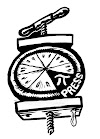

(Yes, that's a large frog with plastic lips Princess Maria is about to kiss.)
From the occasional series, Stuff My Friends and Acquaintances Have Wrought, comes Kate Laity's 2005-2006 play, or "Revue in Several Parts," Fiasco. (Scroll down on that page and you find the hotlink to the free, printable form...and you can get a sense of the rest of the bibliography, with many links.) Kate had a front row seat, while at the University of Houston, to much of the unhappiness around the levy-failure in New Orleans after Hurricane Katrina, and the actual devastation to the Gulf Coast by Katrina itself, but what most sparked this fine bit of satire was Barbara Bush's charming behavior as the refugees were packed into a quickly mythologized Astrodome, never more mythologized than by Bush herself, as Laity quotes her:
“And so many of the people in the arena here, you know, were underprivileged anyway, so this is working very well for them…”-- Barbara Bush, visiting the refugees of Hurricane Katrina in the Houston Astrodome, 2005
And we're off, in a play that is dedicated to Peter Cook, and does in spots remind one powerfully of a Pete and Dud routine, and in others touches on such mutual influences on Cook and Laity as Spike Milligan and the Goons, Samuel Beckett,
Oscar Wilde, Oliver Goldsmith, and Richard Sheridan (the segment featuring the Bush family is subtitled "The New School for Scandal")(not the one in Greenwich Vilalge, no). Fundamentalist Christianity gets at least as much drubbing as the Bushes themselves (and I'm not sure if the character Hodge is partially after Matt Drudge, despite being most obsessed with the clothing the family is wearing), as well as the presumptions of the wealthy about many things, including their own obligations of various sorts. (The segment that might've been entitled "Waiting for Turd Blossom" combines all of these, and ends with the round "Summer is Icumin In"...which gives a sense of the playfulness that is partnered with the satirical rage here.)
A very amusing exercise. (And happy day after the birthday, Kate!)
Maria Bamford, whose 2009 Christmas Special I continue to recommend, has put out three solo albums of her comedy and occasional singing that I'm aware of, and of these perhaps the second, so far, How to Win, is the best introduction to her work for those who haven't seen or heard her before...certainly, the longform Comedians of Comedy concert dvd (as distinct from the multi-episode series on Comedy Central) isn't recommended by me for her, because as one of the hosts, so to speak, she rushes a truncated set so as to give enough time for the other comedians to get a shot on stage (and on camera)...David Cross and H. John Benjamin's self-indulgent and misfired duo bit is allowed to go on forever, however. More self-assured than in her first concert album (The Burning Bridges Tour) and less self-revealing than in the later, slightly darker Unwanted Thoughts Syndrome (both of which are also urgently recommended...the last also comes with a dvd of her web series, dramatizing her life if she'd had a complete breakdown and fled back to her parents' house to recover), How to Win is also her most outspokenly feminist of the three concerts, and catches her at her most energetic and accessible.
Richard Robinson deserves thanks for mentioning the Mosaic Select release of the Toshiko Akiyoshi-Lew Tabackin Big Band box, which collects their 1970s studio album for RCA, which have never before had a legit cd release in the States (the Japanese discs, not atypically, have cost the Earth). Kogun, Long Yellow Road, Tales of a Courtesan, March of the Tadpoles and particularly Insights have been among my favorite albums, and I have had them on vinyl or cassette, or not at all (though I was able to dub one or two from borrowed copies, those dubs hidden away in one moving box or another) for a lot of years...and now here they are, conveniently together (though why leave out the RCA live album Road Time, I dunno...inclusion of the small-label album Tanuki's Night Out would've been a good thing, too...), documenting the bulk of the work of the LA-based orchestra, before Tabackin's desire to move back to NYC and the breakup of that orchestra (so devastatingly documented in the hourlong Jazz Is My Native Language, the best archival/non-contemporary scene in which involves the recently-emigrated Akiyoshi's appearance on What's My Line ca. 1958, wearing full kimono and kit and signing in in Kanji...the line being, Jazz Pianist). Akiyoshi was able to rebuild a New York orchestra, but as good as they often have been I don't think they've ever quite equalled the LA unit. And Michiru Mariano, a few months older than I am, and quite the heartthrob in the film, went from her recording debut on Insights (in the devastating suite Minamata) to go on to be a major acid jazz recording artist, more or less pioneering the form in Japan before returning to the States...
For more forgotten books, etc., please see Patti Abbott's blog...







0 Yorumlar